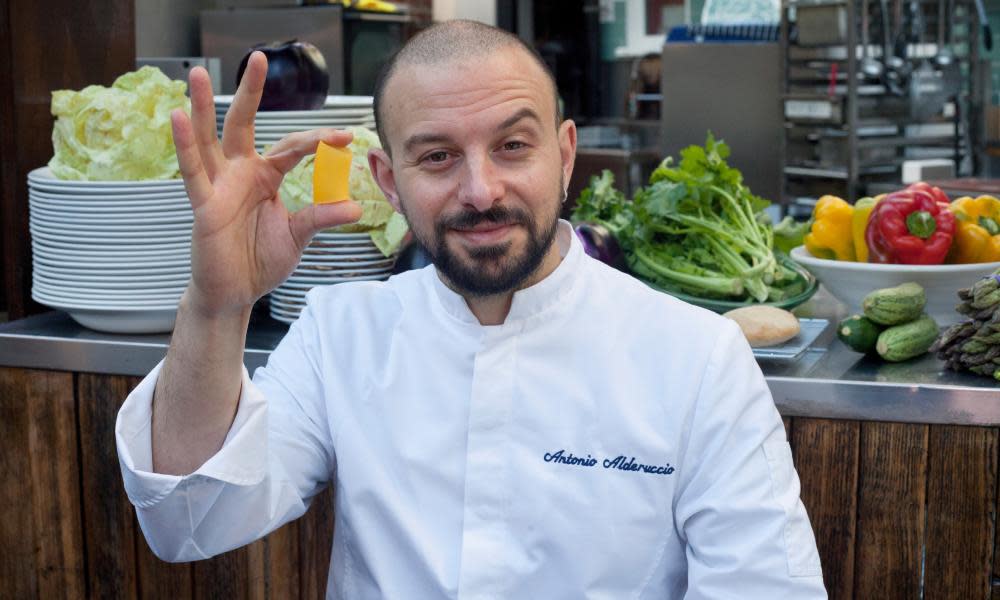The secret behind Britain’s top pasta chef’s winning dish? It’s gluten free and vegan

While sauces, shapes and flavours almost endlessly vary, for hundreds of years all the best pastas have been bound together by one key ingredient: gluten. But Antonio Alderuccio’s revered pasta is different.
Proudly holding the uncooked, yellow, tubular paccheri in his London kitchen, he lists its two ingredients – rice and corn, neither of which contains gluten.
After years of perfecting his recipe and method, he has not only attracted a loyal following at his gluten-free and vegan restaurant, Plant Club in Newington Green, but the respect of the Italian culinary establishment.
In a landmark moment for Italian cuisine in the UK, his paccheri dish, with courgette sauce, asparagus, Burrella (a vegan alternative to burrata) and toasted gluten-free breadcrumbs, has earned him the title of Britain’s pasta chef of the year from the Federation of Italian Chefs (FIC).
It is the first time that a gluten-free pasta, typically seen as gastronomically inferior, has won the Pizza, Pasta & Italian Food Association (Papa) award. The judges, including chef Theo Randall, said it blew them away.
Randall, who serves high-end Italian cuisine at his restaurant at the InterContinental in Mayfair, said he thought they had already found their winner before he tasted Alderuccio’s dish, but quickly changed his mind.
“It made me think ‘wow’. I wasn’t even thinking about that it was gluten-free and the fact that it was vegan,” said the British chef, praising its texture, lightness and seasoning.
“It was mind-blowing, to be honest, absolutely mind-blowing. Beautifully created, the dish looked beautiful and it was a really well-balanced flavour.”
Randall, whose late mother was coeliac, said he has always offered gluten-free pasta in his restaurant, but that not all chefs have embraced gluten-free cooking. “There is a bit of snobbery about it. But everyone’s coming around to the idea that actually, yes, you have to accommodate it.”
Sat under windowed ceilings at a green-marbled table, fresh produce from Italy and the UK waiting in crates on the counter, Alderuccio, 34, said the secret to his paccheri was his rice flour. Rather than using broken grains, it uses milled risotto rice which he says works like magic as a binding agent.
The winning dish, he said, was inspired by the “transition in between the two seasons” from summer into autumn.
He said his victory had been greeted with curiosity by his rivals in the competition, adding that it was difficult for them to concede to a gluten-free and vegan dish, which he believes is viewed by some as second class.
Other pasta varieties he serves at his restaurant include trofie, 3mm thick spirals of pasta that he serves with a turnip greens pesto, chilli flakes and vegan garlic cream and parmesan – made using a blend of corn, sorghum, potato starch, water and guar gum.
But the future, he says, lies in his gluten-free bucatini, spaghetti-like pasta with a hole running through the middle, which he plans to make saucy dishes with. He is also developing a gluten-free and vegan panettone which he says will be ready next year.
Next, he wants to enter his gluten-free and vegan pizza – the style of which was inspired by Italian chef Franco Pepe – into the pizza world championships in Naples in March.
While gluten-free Italian food is often met with scepticism in the UK – even though 1% of people are estimated to have coeliac disease, an autoimmune disorder, and awareness of gluten intolerances is growing – Alderuccio says it is “booming” in Italy. In his hometown, Syracuse in Sicily, he said a renowned patisserie now offered gluten-free treats and that many Naples restaurants now served gluten-free pizzas.
Carmelo Carnevale, president of the Italian Culinary Consortium and a judge of the pasta competition, said plenty of Italian staples – including polenta, risotto and gnocchi – could be gluten-free, but that historically they had not been promoted as such.
Alderuccio, who moved to the UK eight years ago, first started exploring gluten-free and vegan cooking five years ago when he met a friend who was both coeliac and diabetic, making going out for dinner almost impossible. Bored at work and in search of a new challenge, he started experimenting with gluten-free and vegan cooking and, in 2019, co-founded his previous project, Plant Hub.
During the pandemic, he invested in a pizza oven, started testing gluten-free and vegan pizza recipes on his friends and began developing a gluten-free pasta with producers in Italy. The recipes that he created ended up forming the basis for his new restaurant, Plant Club, currently operating as a pop-up, and started attracting attention. When he was invited to enter FIC’s pasta competition he was elated.
Enzo Oliveri, who is president of the Federation of Italian Chefs in the UK and has been judging the competition for seven years, said Alderuccio’s win represented a landmark moment for Italian cuisine.
“I have never heard of a gluten-free pasta winning a competition of this kind,” he said, describing Alderuccio as a “master” and praising his “incredible” pasta.
While at first he said he was sceptical about what the dish would be like, the judging panel were “shocked” by its quality and he ended up beating some of Britain’s best pasta chefs to the prize. To serve gluten-free pasta is, Oliveri said, difficult for restaurants due to the potential for cross-contamination, but that any barriers for chefs are “psychological”. Now, he added, Alderuccio’s success had raised the bar to such a level that he hopes others will be compelled to try to compete with him.
Gluten-free cooking deserves care, he said. “We have to give it the taste that it deserves.”


